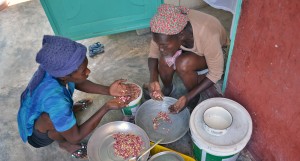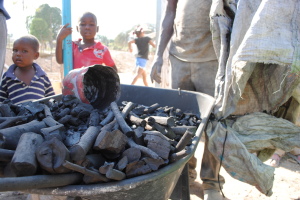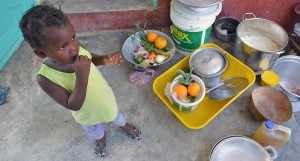Five years ago today at approximately 5pm, a magnitude 7.0 earthquake rocked Haiti. Over three million of Haiti’s ten million people were affected, and over 230,000 deaths were reported. The earthquake put Haiti in the center of the humanitarian agenda- for a little while. It also brought the less-known issue of energy poverty to the table. Aid rushed in, we all saw it on the television and in the newspapers.
 But did we see that people were still going hungry, not because they did not have food, but they lacked the fuel for cooking. Haitians received dry rice rations, dry beans, dry spaghetti that required fuel to cook, but the price of charcoal spiked 40%.
But did we see that people were still going hungry, not because they did not have food, but they lacked the fuel for cooking. Haitians received dry rice rations, dry beans, dry spaghetti that required fuel to cook, but the price of charcoal spiked 40%.
What does it mean to be energy poor? Often the poorest people spend the most on energy. It’s a sad reality in this world. Meaning a Haitian mother will spend more than you or I on energy- that they will spend often half of their income on fuel. To me, its the truest form of the burden to bear. After the initial hurdle of purchasing fuel has been cleared, the next, more silent and more cruel challenge is yet to come.
 Cooking daily over charcoal or wood is one of the most dangerous things you can do. Smoke from these cooking fires causes a laundry list of illnesses, some of them especially fatal- like pneumonia in children under age five.
Cooking daily over charcoal or wood is one of the most dangerous things you can do. Smoke from these cooking fires causes a laundry list of illnesses, some of them especially fatal- like pneumonia in children under age five.
Haiti used to be a powerful sugar and ethanol producer. Sugar from sugarcane was produced processed, used locally and sold abroad. Ethanol was produced from the waste by-product, molasses. In the 1990’s, cheap imported sugar undercut the price of Haitian sugar and effectively began a short and heartbreaking crush of Haiti’s local markets.
After the earthquake, we like so many, wanted to rush in with our stoves, which we knew would have immediate benefits: completely eliminating the need for wood or charcoal and providing a modern fuel which is safe, clean and easy to use. The earthquake was tragic and we all watched Haiti suffer in a very public way. Wanting to help- to do something- it seemed the most human response. We raised funds and worked quickly to get stoves to Haiti.
Once the stoves were safely in Haiti we faced another challenge: the fuel. Ethanol is a global commodity that can be made locally in Haiti. I don’t think you can find any more sustainable fuel for Haiti. Haiti has great potential for ethanol fuel, but the quantity and quality needed for stove fuel were not readily available. In each of our projects, we ultimately come to a halt before the proverbial chicken and egg. For us: stoves vs. fuel. Do you put stoves out and hope the fuel comes? Or do you get the fuel out before releasing stoves. After two decades at this, we’ve seen it all. For Haiti, the fuel won. While difficult to “sit” on these stoves as we worked on the fuel, we felt it was the only fair option. Selling stoves while the fuel supply is uncertain, in this situation, seemed unethical. So, we doubled our efforts on creating a sustainable fuel supply chain.
 It may have taken five years, but we have finally arrived- chicken and the egg. We are working with POET one of the world’s largest producers of ethanol and a local business, Novogaz to lead in this new market for clean energy. POET ethanol donated the first batch of ethanol fuel to Haiti and Novogaz took the lead in creating the local business. This fuel will seed the market, beginning early this year. Ultimately ethanol, along with sugar, can be made locally in Haiti once again on a large scale to supply the growing market for clean cooking. We’ve also worked with Dometic to design a lower-cost stove which can be made locally in Haiti. The stove was extensively tested in Haiti and was found to be well-loved for its cost and for its added firepower over previous versions.
It may have taken five years, but we have finally arrived- chicken and the egg. We are working with POET one of the world’s largest producers of ethanol and a local business, Novogaz to lead in this new market for clean energy. POET ethanol donated the first batch of ethanol fuel to Haiti and Novogaz took the lead in creating the local business. This fuel will seed the market, beginning early this year. Ultimately ethanol, along with sugar, can be made locally in Haiti once again on a large scale to supply the growing market for clean cooking. We’ve also worked with Dometic to design a lower-cost stove which can be made locally in Haiti. The stove was extensively tested in Haiti and was found to be well-loved for its cost and for its added firepower over previous versions.
In the next few months, Novogaz will be rolling out clean ethanol fuel paired with efficient and safe ethanol stoves. We’ve been behind the scenes working hard to make sure that the economics make sense, our supply chain is set up, and the quality and standard we have always been known for is intact.
Everyone has been saying that Haiti is “open for business”. If you ask a Haitian, I’m not sure you will get the same response. It may have taken us five years, but I believe 2015 will be the start of a truly great business in Haiti, backed by the industry and world leaders in clean fuel. Creating a new market for ethanol fuel opens up the value chain and creates jobs at every point. Not only is ethanol fuel it good for people, the environment, and the nation- it is good economics. Our hope is that when we check back in the next five years, 2020, we see a very different Haiti, and one that has picked itself back up in its own way. I have an uncle who has been working in Haiti for over ten years. He once told me that everytime he goes, he feels like he understands the country even less than the trip before. I now know what he means. Whatever happens in Haiti with clean ethanol fuel will probably be in a way that none of us can predict, it will be done the Haitian way. I have a good feeling of what is to come.
A hot street food vendor in Port au Prince cooks cleanly with ethanol side by side a smoky charcoal stove.
To mark the anniversary of the earthquake, I would encourage you to read this article by Shon Van Hulzen, Director of Quality Control for POET Plant Management about our shared vision to bring clean-burning stoves and fuel to Haiti and learn more about the promise of ethanol, which is about to become a reality.
Find out more about our projects in Haiti.
By Brady Luceno

